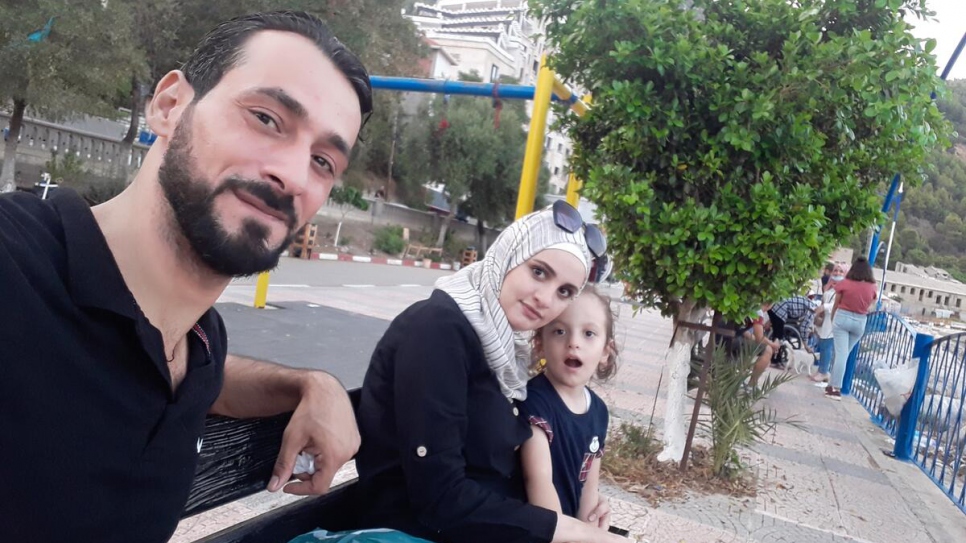Displaced Syrians face bleak Ramadan as economic pain follows COVID-19
Across much of the Middle East and North Africa, Holy Month celebrations are replaced by a struggle for survival amid economic shocks and rising food prices.

Single mother-of-two Shamsa, 32, in her home at an informal settlement for Syrian refugees in Lebanon's Bekaa Valley. © UNHCR/Nour Tarabay
Ahmad had hoped Ramadan would provide some welcome relief for his family this year. Their Holy Month celebrations over the previous two years in northern Lebanon – where the 44-year-old Syrian refugee lives with his wife and five children – had been unusually muted amid nationwide COVID-19 restrictions.
But with Lebanon in the grip of its worst economic crisis in a generation – which has sent the price of food, fuel and other basics skyrocketing and pushed 90 per cent of Syrian refugees in the country into extreme poverty – this Ramadan, Ahmad faces a struggle just to keep his family fed.
As a construction worker, Ahmad has only found three weeks’ work so far this year as jobs have dried up. He spends his evenings walking from shop to shop near his home in Mount Lebanon, trying to buy cheap vegetables before they are discarded just to have something on their table for the Iftar meal at the end of each day’s fast.
“In the past, we were never able to have a copious Iftar; but at least we could buy dates and prepare a salad. This year, we will have a simple meal with just one or two ingredients,” Ahmad says. “Even frying potatoes is expensive, because one litre of oil is worth half a day of work.”
Across the Middle East and North Africa region, while COVID-19 restrictions have largely been lifted, the economic shockwaves from the pandemic are still being felt by millions of displaced families and the communities hosting them.
The impact is being magnified by financial crises engulfing Lebanon and Syria, and more recently by the conflict in Ukraine between two of the world’s biggest grain and oilseed exporters, which has led to price rises of between a third and a half for staples like wheat flour and cooking oil in Lebanon, Syria and Yemen.
"This year, Ramadan will be like any other day."
The result for many people in the region is that instead of the celebratory dishes and atmosphere that usually characterize the Muslim calendar’s holiest month, Ramadan this year will remain an ongoing challenge to provide basic food to their fasting families.
Single mother-of-two Shamsa, 32, fled Syria at the outbreak of the crisis in 2011, and currently lives in a flimsy wood-framed tarpaulin shelter in Lebanon’s Bekaa Valley. Having recently battled the elements though one of the country’s harshest winters in living memory, the family’s prospects remain bleak.
“The last time me and my children ate meat was a year ago, during Ramadan”, she says. “This year, Ramadan will be like any other day. We will eat beans. It is the only thing I can afford.”
It is a similar picture inside Syria itself, where nearly 7 million people remain displaced from their homes and 55 per cent of the total population faces food insecurity. For many, Ramadan is a painful memory of happier times before the crisis.
Khadija, 31, and her family fled their home in Homs’ Bab Dreib neighbourhood amid intense fighting in 2013, moving several times in search of safety before settling in the formerly besieged Al Waer neighbourhood in 2019.
“I remember for Ramadan cooking many meals for the Iftar,” Khadija says with a wistful smile. “Now we can’t afford more than one meal because prices have shot up. Every year – especially during Ramadan – we think it will be the hardest, but it only gets more and more difficult.”
In Jordan, a recent assessment by UNHCR, the UN Refugee Agency, and the World Bank revealed 64 per cent of refugees survive on less than 3 Jordanian Dinars (US$5) a day.
“We depend on UNHCR cash assistance. But we are four months in debt in terms of rent,” explains Mahmoud, 53, originally from Damascus. “We also owe money to the shop where we buy food. I think we will have to borrow more money over Ramadan.”
This year, UNHCR launched its annual Ramadan fundraising campaign with the aim of helping 100,000 families across the region and beyond with cash assistance and other forms of support.
"The situation is becoming more difficult by the day."
Even as far afield as Algeria, Syrian refugees are feeling the combined effects of rising prices and the economic damage wrought by the pandemic. Mohammad Adam, originally from rural Damascus, says the help he and his family received from their neighbours in Algiers has dried up as locals and refugees alike feel the pinch.
“This year, Ramadan is more difficult than ever, because those people who helped us at the beginning of COVID-19 have also lost their jobs and are living in precarious conditions,” Mohammed explains.
As a result, he is forced to worry about his family’s most basic needs – keeping a roof over their heads and food on the table – and the usual Ramadan celebrations have taken a back seat while many focus on basic survival.
“Most Syrian refugees here owe at least one year of rent, and the situation is becoming more difficult by the day with the increase in food prices. There are a lot of people who don’t have enough to eat.”
Reporting by Paula Barrachina Esteban and Dalal Harb in Lebanon, Saad Sawas in Syria, Lilly Carlisle in Jordan, and Marina Villuendas in Algeria.




